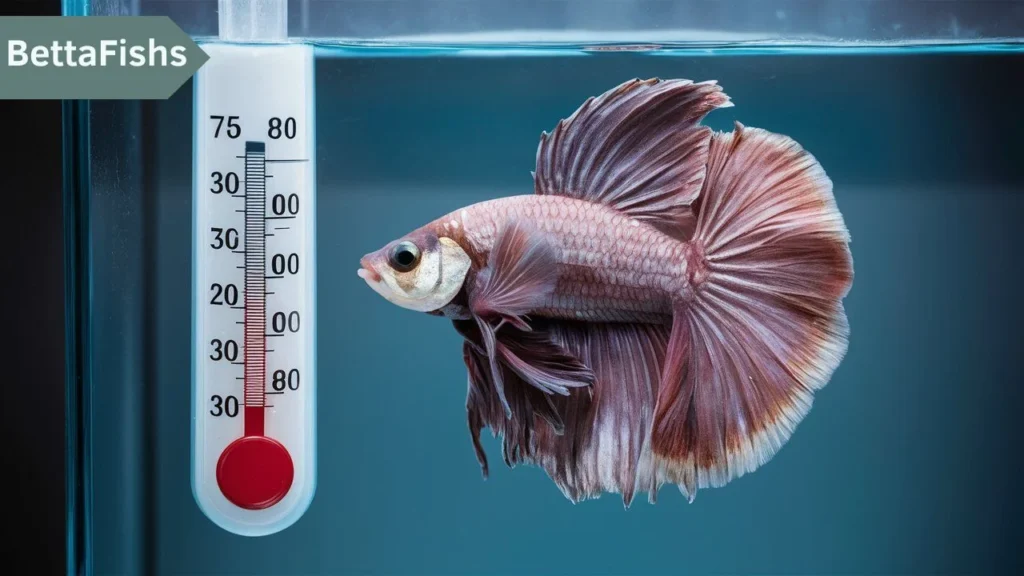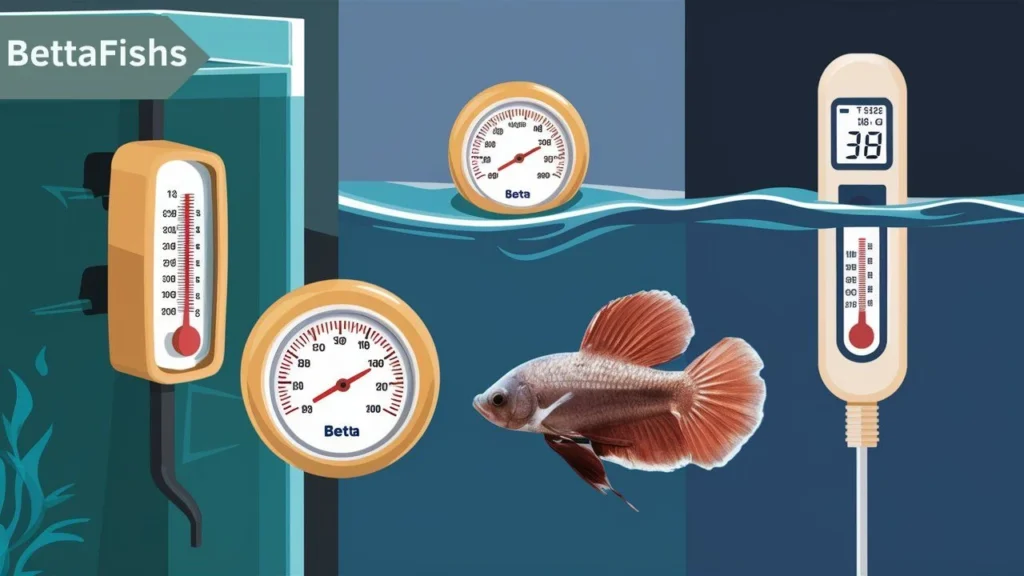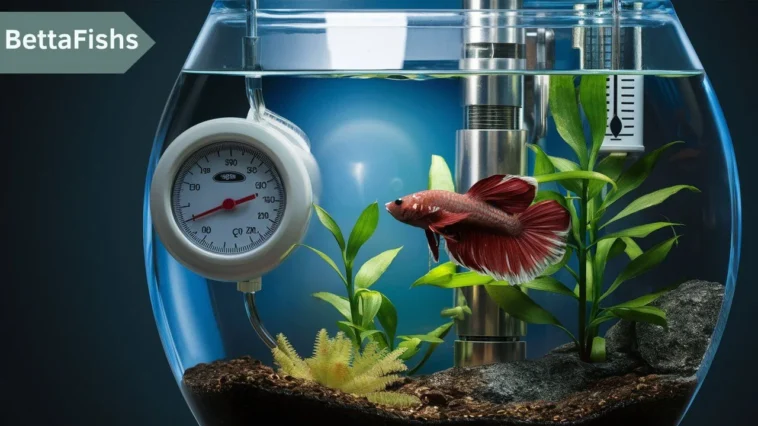What should the water temperature be for a Betta fish? Aquarium aficionados love betta fish because of their vivid colors and graceful fins. However, caring for these beautiful creatures involves more than just admiration; it requires attention to their environment, particularly the water temperature. But what should the water temperature be for a Betta fish? Let’s dive into this topic to ensure your Betta stays healthy and happy.
Betta Fish
What Are Betta Fish?
Betta fish, also known as Siamese fighting fish, are small, colorful freshwater fish native to Southeast Asia. Known for their aggressive nature, especially among males, they are often kept alone in tanks. However, aside from their temperament, Betta fish have specific environmental needs that must be met to thrive.
Natural Habitat and Its Impact on Temperature Needs
In the wild, Betta fish are found in the warm, shallow waters of Thailand, Cambodia, and Vietnam. These waters are typically still and warm, with temperatures ranging between 75°F and 80°F (24°C – 27°C). This natural habitat has shaped the Betta’s temperature preferences, making it crucial to replicate similar conditions in your home aquarium.
Ideal Water Temperature for Betta Fish
Optimal Temperature Range
The ideal water temperature for a Betta fish is between 75°F and 80°F (24°C – 27°C). It is vital for their health and well-being that they stay within this range. Temperatures outside this range can cause stress, leading to various health issues and even shortening the fish’s lifespan.
Why This Temperature Is Important
Betta fish are cold-blooded, meaning their body temperature is regulated by the water around them. If the water is too cold, their metabolism slows down, making them sluggish and more susceptible to diseases. On the other hand, if the water is too warm, it can increase their metabolism too much, causing stress and potentially leading to a shortened life span. Keeping the temperature within the recommended range ensures that your Betta fish can thrive.
Effects of Incorrect Water Temperature
Health Risks of Too Low Temperatures
When the water temperature drops below 75°F (24°C), Betta fish can experience a range of health problems. Cold water slows down their metabolic rate, leading to lethargy and a weakened immune system. This can make them more prone to diseases like fin rot and ich. In severe cases, prolonged exposure to low temperatures can be fatal.
Health Risks of Too High Temperatures
On the flip side, water that is too warm—above 80°F (27°C)—can also be detrimental. High temperatures can accelerate a Betta’s metabolism, leading to increased stress, faster aging, and a higher likelihood of developing diseases. Additionally, warm water holds less oxygen, which can cause breathing difficulties for your Betta.
Behavioral Changes Due to Temperature Fluctuations
Betta fish are sensitive to temperature changes, and even minor fluctuations can cause noticeable behavioral changes. If the water temperature suddenly drops, you might notice your Betta becoming less active, hiding more, or even refusing to eat. Conversely, if the water becomes too warm, your Betta may become hyperactive, constantly swimming around, or showing signs of stress like fin clamping.

Monitoring Water Temperature
Importance of a Reliable Thermometer
A reliable aquarium thermometer is essential to maintain the proper water temperature for your Betta fish. This allows you to keep a constant eye on the temperature, ensuring it stays within the ideal range. An inaccurate thermometer can lead to dangerous temperature fluctuations that could harm your Betta.
Different Types of Thermometers for Aquariums
There are several types of thermometers available for aquariums:
- Stick-on thermometers: These attach to the outside of the tank and are easy to read, but they may not always provide the most accurate readings.
- Floating thermometers: These float in the water and are generally more accurate than stick-on thermometers.
- Digital thermometers: These provide the most precise readings and often come with an alarm feature to alert you if the water temperature goes out of the desired range.
Heating Solutions for Betta Tanks
Choosing the Right Heater
A heater is crucial for maintaining the correct water temperature in your Betta tank. Take your tank’s size into consideration while choosing a heater. A heater with the appropriate wattage will ensure that the temperature remains stable. For smaller tanks, a heater with 25-50 watts is usually sufficient, while larger tanks may require a heater with higher wattage.
Heater Placement in the Tank
Where you place the heater in your Betta tank can also affect the water temperature. Ideally, the heater should be placed near the water flow, such as near the filter outlet, to ensure even heat distribution throughout the tank. Avoid placing the heater too close to the tank walls, as this can cause uneven heating.
How to Maintain a Consistent Temperature
To maintain a consistent water temperature, it’s important to regularly check the heater and thermometer. Make sure the heater is functioning properly and adjust it if necessary. It’s also a good idea to have a backup heater on hand in case of failure, especially during the colder months.
Adjusting Water Temperature
How to Safely Raise the Water Temperature
If the water temperature in your Betta tank is too low, you can raise it gradually by adjusting the heater. Increase the temperature by no more than 1-2°F (0.5-1°C) per hour to avoid shocking your Betta. It’s important to make these changes slowly to give your Betta time to acclimate to the new temperature.
How to Safely Lower the Water Temperature
If the water temperature is too high, you can lower it by turning down the heater or temporarily removing the heater altogether. Additionally, you can add cool water to the tank, but be sure to do this slowly and in small amounts to avoid causing sudden temperature fluctuations.
Signs Your Betta Fish Is Suffering from Temperature Stress

Physical Symptoms to Watch For
If your Betta is experiencing temperature stress, you may notice several physical symptoms, including:
- Faded colors
- Clamped fins
- Rapid gill movement
- Lethargy or inactivity
- Loss of appetite
Behavioral Symptoms to Watch For
Behavioral changes are also a key indicator of temperature stress. Watch for signs such as:
- Hiding more frequently
- Darting around the tank
- Gasping for air at the water’s surface
- Erratic swimming patterns
How to Recover a Betta from Temperature Shock
Immediate Steps to Take
If you suspect your Betta is suffering from temperature shock, the first step is to stabilize the water temperature. Gradually adjust the heater to bring the water back within the ideal range. Avoid sudden changes, as this can further stress your Betta.
Long-Term Recovery Tips
After stabilizing the temperature, monitor your Betta closely over the next few days. Ensure the water quality is optimal, and consider adding stress coat additives to the water to help your Betta recover. Providing a calm, stress-free environment will also aid in their recovery.
Betta Fish and Tank Mates: Temperature Compatibility
Choosing Compatible Tank Mates
If you plan to keep your Betta fish with other species, it’s important to choose tank mates that thrive in similar water temperatures. Species such as Corydoras catfish, Neon tetras, and certain types of snails are generally compatible with Betta fish in terms of temperature needs.
Adjusting the Environment for All Species
When housing multiple species, make sure the tank environment meets the needs of all inhabitants. This includes maintaining the appropriate temperature, providing adequate hiding spots, and ensuring that the tank is large enough to accommodate everyone comfortably.
Maintaining Water Quality Alongside Temperature
Importance of Water Quality for Betta Health
While temperature is crucial, water quality is equally important for the health of your Betta fish. Poor water quality can lead to a host of problems, including ammonia poisoning, fin rot, and other illnesses.
How Temperature Impacts Water Quality
Water temperature can directly affect water quality. Warmer water tends to have lower oxygen levels, which can be detrimental to your Betta’s health. Additionally, higher temperatures can accelerate the breakdown of waste in the tank, leading to increased ammonia levels. Regular water changes and proper filtration are essential to maintaining both temperature and water quality.

Conclusion
Maintaining the correct water temperature for your Betta fish is crucial for their health and longevity. By understanding their natural habitat, using the right equipment, and monitoring the temperature consistently, you can create an environment where your Betta can thrive. Remember, a happy Betta is a healthy Betta, and a stable water temperature is one of the key factors in achieving this.
FAQs
Can Betta fish survive in cold water?
Betta fish can survive in cold water, but it’s not ideal. Cold water can slow down their metabolism and weaken their immune system, making them more susceptible to diseases.
What happens if the water temperature fluctuates?
Fluctuations in water temperature can cause stress and lead to various health issues in Betta fish, including temperature shock, lethargy, and even death in severe cases.
Do Betta fish need a heater in tropical climates?
Even in tropical climates, it’s recommended to use a heater to maintain a consistent water temperature, as room temperature can fluctuate, especially at night.
How can I tell if my Betta is too cold?
Signs that your Betta is too cold include lethargy, clamped fins, loss of appetite, and hiding behavior. They may also become more susceptible to diseases like ich.
Can a Betta fish recover from temperature shock?
Yes, with prompt action, a Betta fish can recover from temperature shock. Gradually stabilizing the water temperature and providing a stress-free environment are key to their recovery.





One Comment
Leave a ReplyOne Ping
Pingback:How to warm Betta fish water?